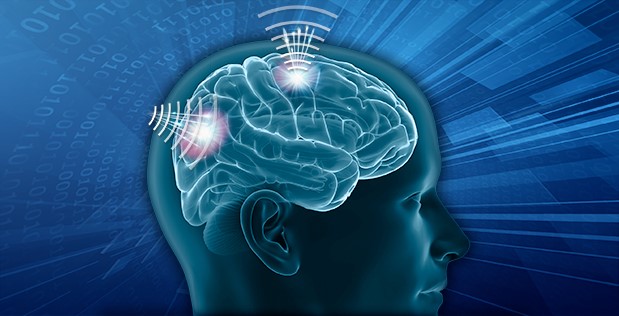DARPA invests in nonsurgical neurotechnologies for eventual use in healthy human subjects
 ___
___
Nonsurgical Neural Interfaces Could Significantly Expand Use of Neurotechnology (DARPA News):
“Over the past two decades, the international biomedical research community has demonstrated increasingly sophisticated ways to allow a person’s brain to communicate with a device, allowing breakthroughs aimed at improving quality of life, such as access to computers and the internet, and more recently control of a prosthetic limb.
The state of the art in brain-system communications has employed invasive techniques that allow precise, high-quality connections to specific neurons or groups of neurons. These techniques have helped patients with brain injury and other illnesses. However, these techniques are not appropriate for able-bodied people. DARPA now seeks to achieve high levels of brain-system communications without surgery, in its new program, Next-Generation Nonsurgical Neurotechnology (N3).
Noninvasive neurotechnologies such as the electroencephalogram and transcranial direct current stimulation already exist, but offer nowhere near the precision, signal resolution, and portability required for advanced applications by people working in real-world settings …“We’re asking multidisciplinary teams of researchers to construct approaches that enable precise interaction with very small areas of the brain, without sacrificing signal resolution or introducing unacceptable latency into the N3 system,” Emondi said. The only technologies that will be considered in N3 must have a viable path toward eventual use in healthy human subjects…
DARPA is being similarly proactive in considering the ethical, legal, and social dimensions of more ubiquitous neurotechnology and how it might affect not only military operations, but also society at large. Independent legal and ethical experts advised the agency as the N3 program was being formed, and will continue to help DARPA think through new scenarios that arise as N3 technologies take shape … As the research advances, published N3 results will further facilitate broad consideration of emerging technologies.”
Upcoming Event:
DARPA-SN-18–38: Next-Generation Non-Surgical Neurotechnology (N3) Proposers Day
- Synopsis: The Biological Technologies Office (BTO) of the Defense Advanced Research Projects Agency (DARPA) is hosting a Proposers Day for the potential proposer community in support of a planned Broad Agency Announcement (BAA) for the Next-Generation Non-Surgical Neurotechnology (N3) program. The Proposers Day will be held on April 3, 2018, at the DARPA Conference Center in Arlington, VA. Advance registration is required. The event will be webcast to provide limited interaction for those who would like to participate remotely. See Special Notice Attachment for full details.
- DATE: April 3, 2018
- LOCATION: Arlington, VA
News in Context:
- Eight research teams working with DARPA to discover best ways to activate neuroplasticity and accelerate learning
- DARPA launches Targeted Neuroplasticity Training program to accelerate cognitive skills training
- Five reasons the future of brain enhancement is digital, pervasive and (hopefully) bright
- 10 neurotechnologies about to transform brain enhancement and brain health
- With two new funding mechanisms, The Chan Zuckerberg Initiative reaches out of neuroscience to expand its Neurodegeneration Challenge Network


